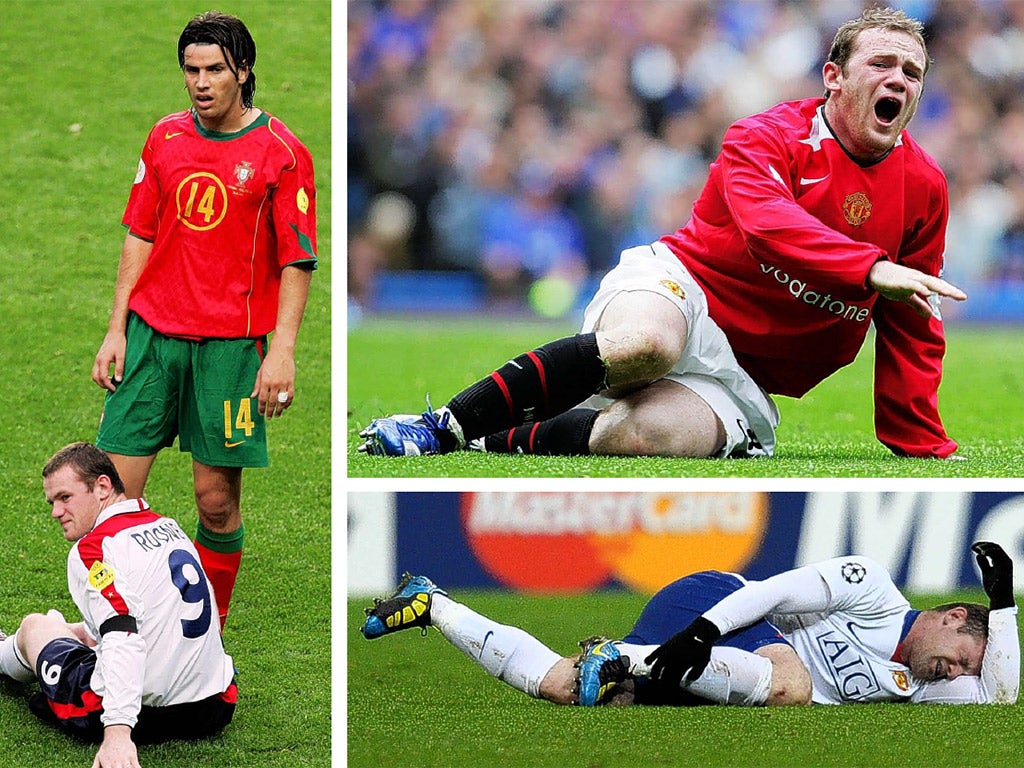Wayne Rooney injury: It’s déjà vu for the Manchester United striker but maybe a rest is best for England
After a metatarsal break in 2006 and a knee injury in 2010, six-weeks off may be the perfect preparation for what could conceivably be his last international tournament

It all feels desperately familiar. An international tournament looming, England’s hopes resting substantially on his shoulders and then another of those announcements which we know will consign us to weeks – perhaps months – looking for the signs that Wayne Rooney will be fit in time.
The only difference between the 2010 World Cup, when an ankle issue plagued him, and his knee injury now is that Louis van Gaal was more transparent about things. Sir Alex Ferguson always considered players’ fitness his own business and none of ours.
“You could never say how long he could be out for,” Van Gaal said in Denmark, which meant the expected six weeks before Rooney is ready to play could extend into May – and the dog days of the season.
That would certainly mean something consistent with the 2006 metatarsal break which also left him touch-and-go, before the proclamation – to paraphrase a line that was famously uttered at the Germany World Cup finals by a Football Association official and later attributed to Rooney – that “the big man is back in town”.
Add the litany of injuries in England tournament years to the ban which excluded him for the first two matches of Euro 2012 – after he was sent off in England’s final qualifier in Montenegro – and the pattern looks weirdly consistent. If not Rooney it has been David Beckham, or Gareth Barry who has occupied the nation’s hopes and fears when the month of the biennial international cycle comes around.
But though Van Gaal has source for personal angst, given Rooney’s seven goals in the last nine games and his substantial part in attempting to bridge the six-point gap between United and fourth-placed Manchester City in the pursuit of a Champions League spot, there are reasons to be philosophical.
United can reflect on their lack of options, with Javier Hernandez off scoring freely for Bayer Leverkusen and loanee James Wilson hardly pulling up trees at Brighton & Hove Albion, but the England manager, Roy Hodgson, can at least reflect that his talisman will have had some rest.
The 2010 ankle injury, sustained early in United’s Champions League quarter-final first leg against Bayern Munich, was exacerbated by Ferguson’s decision to play Rooney in the second leg. Those present on that spring night at Old Trafford will recall how the manager’s team sheet was viewed with incredulity. But the way that year’s injury was sustained – Rooney turning his right ankle badly on landing after tracking a run by Mario Gomez – underlined the inconvenient truth about the striker. He is an injury waiting to happen, because of the relentless effort levels he puts in.
Fabio Capello, the England manager at the South Africa World Cup, always told him in no uncertain terms that he must cut out the workhorse routine, spend less time occupying space where his own side’s full-back should be, and more in the six-yard box, “being selfish”, as Rooney put it.
That’s just not the way he plays, though. It was extremely significant that the severity of this injury seems to have stemmed from the player’s decision to play on with it at Sunderland, in a team which he carries more than any other we have known at Old Trafford. “Brave,” is what Van Gaal called him. “Foolish,” Capello and Hodgson would both say.
At 30, a need to moderate his work rate is greater than ever for a player whose physiology is not ideal for a 90-minute distance run. A six-week rest may be the perfect preparation, leaving a fit, firing and free-running Rooney prepared for what could conceivably be his last international tournament.
Join our commenting forum
Join thought-provoking conversations, follow other Independent readers and see their replies
Comments
Bookmark popover
Removed from bookmarks